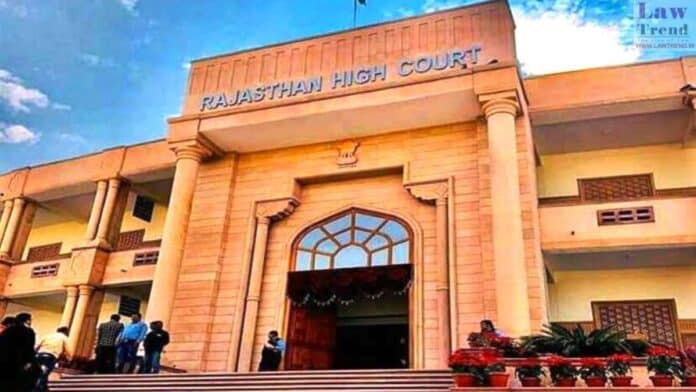Jaipur: Reciting the Sanskrit shloka “Yatra Naryastu Pujyante Ramante Tatra Devata” (Where women are worshipped, there the Gods dwell), the Rajasthan High Court has upheld the termination of a Kendriya Vidyalaya Sangathan (KVS) teacher found guilty of immoral sexual behaviour towards a Class VI student. The Division Bench, comprising Justice Vinit Kumar Mathur and Justice Ravi Chirania, dismissed the writ petition filed by the Ex-TGT teacher, affirming the decision of the Central Administrative Tribunal (CAT), Jaipur.
Case Background
The petitioner, a 62-year-old Ex-TGT teacher, was appointed as a Primary Teacher in the KVS, Jaipur Region, in 1990. On February 6, 2015, a complaint was lodged against him alleging “immoral sexual harassment and misbehavior” with a minor student, referred to as Child ‘A’.
Following the complaint, a committee was constituted on February 7, 2015, which submitted a report on February 11, 2015, confirming the allegations. The petitioner was suspended on February 12, 2015. Subsequently, a summary inquiry committee constituted by the Deputy Commissioner, KVS, Ahmedabad, submitted its report on March 18, 2015, holding the petitioner prima facie involved in immoral behaviour.
After serving a show cause notice and considering the petitioner’s explanation, the Disciplinary Authority terminated his services on October 16, 2015, under Article 81(B) of the Education Code. The petitioner challenged this order before the CAT, Jaipur, which dismissed his Original Application on August 28, 2024. The petitioner then moved the High Court challenging the Tribunal’s order.
Arguments of the Parties
Counsel for the petitioner argued that the petitioner had been falsely implicated. He contended that the complaint was “managed and filed” by the parents of the student at the behest of a school teacher, Ms. Sadhana, because the petitioner had objected to her private tuitions.
The counsel further submitted that there were “stark contradictions” in the two statements recorded of Child ‘A’ and that the inquiry committee exerted pressure on other students. He asserted that the services were dispensed with by adopting a “short-circuit method” without a reasonable opportunity of hearing, violating the mandatory conditions of Article 81(B) of the Education Code.
Court’s Analysis and Observations
The High Court, in its judgment delivered on November 27, 2025, strongly condemned the conduct of the petitioner. Opening with the Sanskrit shloka “Yatra Naryastu Pujyante Ramante Tatra Devata” (Where women are worshipped, there the Gods dwell), the Court observed:
“In Indian culture and society, women are respected and honoured for the well-being of the community, and any misconduct towards them invites serious consequences… In the present case, a female child studying in Class VI has become the victim of a person who was responsible for shaping the future of young students.”
Reliability of Victim’s Statement The Court scrutinized the statements of the victim child, which detailed the incidents of February 2, 2015. The judgment noted the child’s specific allegations that the petitioner touched her inappropriately and made objectionable remarks regarding her physical appearance.
Rejecting the defense’s claims of contradictions, the Bench stated:
“In our considered opinion, even the statement of victim child ‘A’ is sufficient to bring home the allegations levelled against the petitioner… There is no reason for this Court to disbelieve the statement of child ‘A’ as there was no enmity or reason either for the child ‘A’ or her family member to falsely implicate the petitioner in this case.”
Rejection of Conspiracy Theory The Court dismissed the argument regarding the involvement of the colleague, Ms. Sadhana, terming it “nothing but an afterthought.” The Bench noted that it is “hard to believe that Ms. Sadhana will take the services of a small child to settle her personal scores.” The Court further highlighted that eight other students had deposed before the committee supporting the truth of the incident.
Procedural Compliance Regarding the procedure adopted for termination, the Court held that the respondents had conducted a “thorough enquiry” and “duly complied with the mandate of Article 81(B) of the Education Code.” The Court observed that the termination order dated October 16, 2015, was “elaborate and speaking one,” passed after providing a reasonable opportunity to the petitioner to defend his case.
Decision
The High Court concluded that the allegations were serious in nature and the order of termination was “justified and is commensurate with the offense alleged.”
Finding no merit in the petition, the Court held:
“Learned Tribunal has examined the matter in detail and has rightly come to the conclusion that the order passed by the respondent is in conformity with the provisions of law.”
Accordingly, the writ petition was dismissed.
Directive on Privacy of Minors
Before parting with the judgment, the High Court noted that the Tribunal’s impugned order had mentioned the name of the victim. Citing guidelines, the Bench issued a strict observation:
“…all Presiding Officers must refrain from mentioning the names of minor children in such matters while passing orders or judgments.”




